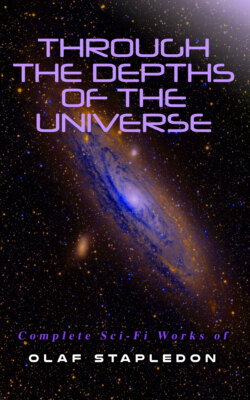Читать книгу Through the Depths of the Universe: Complete Sci-Fi Works of Olaf Stapledon - Olaf Stapledon - Страница 90
На сайте Литреса книга снята с продажи.
3. INFLUENCING PAST MINDS
ОглавлениеTable of Contents
Our power of taking effect on past minds is much more restricted than our power of passively observing their processes. It is also a much more recent acquisition. To you it seems impossible; for future events, you suppose, have no being whatever until their predecessors have already ceased to exist. I can only repeat that, though future events have indeed no temporal being until their predecessors have ceased to exist with temporal being, all events have also eternal being. This does not mean that time is unreal, but that evanescence is not the whole truth about the passing of events. Now some minds, such as ours, which are to some extent capable of taking up the point of view of eternity, and of experiencing the eternal aspects of past events in other minds, can also to some extent contribute to the experience of those minds in the past. Thus when I am observing your mental processes, my activity of observing is, in one sense, located in the past. Although it is carried out from the point of view of my own experience in the future, it enters the past through the eternal side of past events in your minds. When I act upon your minds, as for instance in inculcating thoughts and images in the writer of this book, that activity of mine is located in your age. Yet it is done, so to speak, from my purchase in the future, and with all my Neptunian experience in view.
From this rare but important action of the future on the past it follows that past events, which themselves cause future events, are in part the product of future events. This may seen unintelligible. But in fact there is no more mystery in it than in the reciprocal interaction of two minds that know one another. The one, which owes its form partly to the other, is itself one factor determining the other’s form.
As I said before, the only way in which we can influence a past mind is by suggesting in that mind some idea or desire, or other mental event, which is intelligible to a mind of that particular order, and is capable of being formulated in terms of its own experience. Some minds are much more receptive than others. The great majority are wholly impervious to our influence; and, even among those who are not insensitive, very many are so strictly dominated by their own desires and prejudices that any thought or valuation which we consider worth suggesting to them is at once violently rejected.
There are many complications and difficulties in this strange work. In the first place we may chance to do serious damage to the past mind by unwise influence, for instance by presenting it with ideas which are too disturbing to its nature. For though some ideas are so foreign to a mind that they are simply rejected, others, though alien to the superficial part of its nature, may be incendiary to the submerged part, as sparks falling upon tinder. Thus an idea which to the explorer seems straightforward and harmless may produce in the past mind a self-discrepant experience both of revelation and of horror; and the resulting conflict throughout the mind may lead to catastrophe. Or the idea may so captivate and exalt the unfortunate person that he loses all sense of proportion, is instigated to some fantastic course of action, and finally comes into serious collision with his society.
Another difficulty lies in the fact that our influence is not always voluntary. Thoughts and desires of our own, which we have no intention of transmitting, may sometimes find their way into the mind under observation; and their effect may be disastrous. For instance, a sudden surge of contempt or indignation on the part of an inexperienced explorer, when he observes his ‘host’ commit some egregious folly or meanness, may flood a hitherto complacent mind with bewildering self-contempt. And this novel experience, coming thus without preparation, may shatter the whole flimsy structure of the mind by destroying its carapace of self-pride. Or again, the explorer’s own clear-eyed and ecstatic view of the cosmos, as both tragic and worshipful, may sear the optimistic faith of a primitive religious mind, without being able to raise it to the loftier worship.
Our influence, then, upon the past is a very much more precarious and restricted power than our past-exploration. All that we can do is to offer to a very small minority of minds some vague hint of a truth or of a beauty which would otherwise be missed, or some special precept, or seminal idea, relevant to the mind’s particular circumstances. This may be done either by a constant ‘tilting’ of the mind in a certain general direction, or, much more rarely, by occasional impregnation of the mind with some precise idea or valuation. In very exceptional cases, which number no more than one in many thousands of millions, we can subject the individual to a constant stream of detailed suggestion which he himself can embody in a more or less faithful report. But here we find ourselves on the horns of a dilemma. To undergo this detailed suggestion, the individual must be extremely receptive; but in the main those that are extremely receptive lack originality, so that, in spite of their detailed receptivity, they either entirely miss the true spirit of the communication, or fail to embody it in a manner capable of stirring their fellows. On the other hand the highly original minds, even when they are also very receptive, tend deliberately to ignore the detail of the suggestion. Thus they produce works which, though true to the spirit of the suggestion, are embodied in manners expressive of their own genius.
